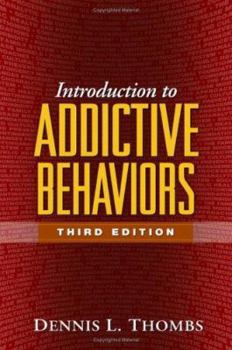Introduction to Addictive Behaviors, Third Edition
Select Format
Select Condition 
Book Overview
Now revised and updated, this widely used text comprehensively reviews theories of addiction to give students and professionals a multidisciplinary foundation for clinical practice. It explores the... This description may be from another edition of this product.
Format:Hardcover
Language:English
ISBN:1593852789
ISBN13:9781593852788
Release Date:March 2006
Publisher:Guilford Publications
Length:322 Pages
Weight:1.30 lbs.
Dimensions:1.1" x 7.0" x 9.2"
Customer Reviews
3 ratings
Explodes Popular Myths about Addiction and Challenges Existing Theories
Published by Thriftbooks.com User , 17 years ago
When I was working on my undergrad honors thesis related to addiction, my project advisor recommended this book to me, and I'm glad that I read it. I have since recommended it to a teacher for my substance abuse class, because it offers a balanced critique of some of the popular addiction theories circulating today. Dennis Thombs compares the different theories and discusses the substantive attributes of all addiction theories. Since I have a degree in theology, I appreciated that in the 2nd edition, Thombs moves away from criticizing "addiction as sin" to criticizing "addiction as immoral conduct." To me, this is less controversial because Christians view addiction as a manifestation of sin WITHOUT judging a person as being more immoral because sin is common to ALL of humanity. Therefore, Thombs first criticizes addiction as immoral conduct on the basis that addicts do not completely choose their behavior. Second, Thombs provides research that explodes the myth that addiction is a disease that we have no control over and that we can blame our behavior on. He practically shatters the whole disease model of addiction that makes the addict a victim of nature. He suggests, instead, that addiction is more like a brain injury that is a result of and reinforced by our choices. Third, Thombs shows how behavioral scientists view addiction as "maladaptive behavior." He writes, "The person with an addiction problem is seen as a victim--not a victim of a disease but a victim of destructive learning conditions." (p. 4) I do agree with another reviewer, Gillepsie, that Thombs never discusses the spiritual elements of addiction, which I believe is important too, as the 12-step groups have discovered. Yet, the book is a necessary corrective to the models that blame anybody or anything except the addict. The problem with some of these views is that they deny personal responsibility. Thombs shows that addicts still can make choices, albeit under a lot of internal and external pressure. This book reminds me of the history of the debates over human nature and free will. The question that we will always struggle with is, how free is the human will? Thombs offers some well-rounded treatment solutions. After reviewing the major models, Thombs wraps it up with a discussion on the motivation for change, and talks about Motivational Enhancement Therapy, or Motivational Interviewing. I studied the 2nd edition, but I expect that the 3rd edition will contain important updates and even more recent research on the field. The book also includes chapter summaries and review questions for each chapter, making it an excellent textbook. Overall, this comprehensive book is a must-read for anyone who claims to know anything about addictions. 2nd Edition Chapters: 1. Multiple Conceptions of Addictive Behavior and Clinical Practice Today 2. The Disease Models 3. Psychoanalytic Formulations 4. Conditioning Models and Approaches to Contingency Management 5. Cognitive Models
Very Organized. Explains with responsability, not blame.
Published by Thriftbooks.com User , 18 years ago
This book is actually really good. It is very organized and easy to read-- Many diagrams and "outline" type break down of key concepts throughout. Smaller paragraphs that stay on point and smaller chapters make it easier to read and understand. Questions at the end help for studying and to see if you understand the concepts. Explains actions from a variety of perspectives: emotional, behavioral, environmental, social, etc. Really helps you "get in the mind" of an addicted person and see how you might help or at least understand. I used it as a text book for a psych class but it would be really really helpful for the lay person with a loved one or self addicted b/c it helps explains why/how/etc. and understanding can help you move past it and heal. Also realise how hard it would be to be "by yourself" and the need for support and assistance. Most problems with adiction start with psychological or emotional issues and this book helps explain that process.
Buy the book!
Published by Thriftbooks.com User , 23 years ago
Thombs (1999) offers a comprehensive review of the different theoretical approaches to addictive behavior. I found his differentiation between biological, psychological, and sociological perspectives quite helpful. He further breaks down psychological perspectives on addiction into psychoanalytic, behavioral, and cognitive models. Thombs also discusses the medical model of addiction that is derived from psychiatry. However, the text has two drawbacks. First, I never felt he gave a clear differentiation between "dependence" and "addiction" across all perspectives (e.g., biological, psychological, & sociological). Another drawback concerns the book's lack of emphasis on current "spiritual" approaches to dependence and addiction. He discusses the "moral model" of addictive behaviors early in the book but never re-visits the topic in detail. Current research and practice seem to emphasize a spiritual element to addictive behaviors.





